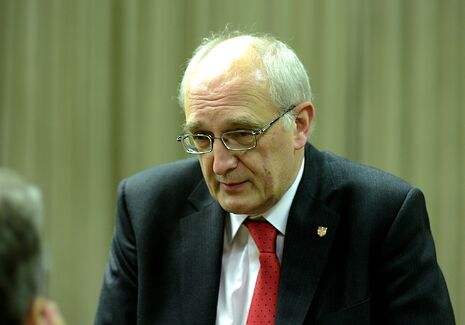Price of the Vice
Cambridge’s Vice-Chancellor earns nearly nine times the average university salary, Freedom of Information requests reveal

Cambridge’s Vice-Chancellor, Professor Sir Leszek Borysiewicz, is one of the highest spending in the UK and lives in the most expensive university residence, it has been revealed.
Freedom of Information requests have revealed that the average annual salary of Vice-Chancellors at UK universities has increased by £12,000 in the last year to £272,000.
Borysiewicz earned £325,000 in 2014/15, amid “inflation-busting” increases for university VCs across the country. His pay package is nearly nine times the university’s average yearly salary (including additional payments) for 2013/14, which was £36,912. Borysiewicz’s current pay packet represents a 43 per cent increase on his predecessor Alison Richard’s salary for 2008/09, £227,000.
It places him among the seven highest-paid senior post-holders in the university. The University of Cambridge currently employs 336 people who are being paid over £100,000 a year, with two employees currently earning more than £399,000 a year.
The University and College Union (UCU), which conducted the research, said universities spent thousands of pounds on flights and other expenses for Vice-Chancellors.
UCU’s research found that the average expenditure on flights was £8,560.37, with 50 per cent of flights being in first or business class, and with 21 university leaders flying exclusively in these two classes.
Borysiewicz’s bill for flights was four times the national average of £8,560 for VCs, standing at a total of £38,786. Cambridge declined to give information as to what percentage of the flights Borysiewicz took in 2014/15 were first- or business-class. For his hotel bill, the Cambridge VC’s expenditure of £18,161 was six times the national VC average of £2,989.93.
Borysiewicz’s residence is by far the most valuable out of all those the report lists, worth £4.52 million according to a valuation from July 2014. The second most expensive was that of the University of Bath’s VC, where the comparative market sale value of the accommodation was £2.85 million.
Borysiewicz’s total remuneration for 2014/15 actually featured a drop of 6 per cent from 2013/14, when he received £344,000.
In a statement, a university spokesperson said: “as the leader of a global institution the Vice-Chancellor represents the university externally... This involves foreign travel and promoting the university’s mission and its vital fundraising objectives.”
The spokesman continued by saying: “The Vice-Chancellor’s Lodge is an official residence which is used for University events and for hosting visiting dignitaries from around the world.”
By comparison, the University of Oxford’s former head Professor Andrew Hamilton had a package – including pension contributions and benefits – of £462,000.
In a statement, a spokesperson for Oxford said: “Its [Oxford’s] research output is vast, it has more than £1bn a year in turnover, not including the colleges and Oxford University Press, and it has great institutional complexity...The Vice-Chancellor’s salary reflects that.”
UCU General Secretary, Sally Hunt, said: “the time has finally come for a frank and open discussion about pay and transparency in higher education”, adding that “the huge disparities in the levels of pay rises at the top expose the arbitrary nature of senior pay in our universities.
“While some continue to enjoy inflation-busting pay hikes and all the trimmings of first-class flights and luxury hotels, staff pay continues to be held down. We will continue to campaign for a proper register of pay and perks at the top of our universities.”
A representative from Universities UK said Vice-Chancellor pay aligned with equivalent roles nationally.
“The remuneration packages of vice-chancellors are determined by independent remuneration committees at each individual institution and are publicly available in universities’ annual reports and accounts.”
“The salaries of university leaders in the UK are in line with those in competitor countries and comparable to similarly sized public and private organisations.”
 News / Students form new left-wing society in criticism of CULC3 September 2025
News / Students form new left-wing society in criticism of CULC3 September 2025 News / Robinson historian calls to recognise first King of England4 September 2025
News / Robinson historian calls to recognise first King of England4 September 2025 News / Tompkins Table 2025: Trinity widens gap on Christ’s19 August 2025
News / Tompkins Table 2025: Trinity widens gap on Christ’s19 August 2025 Comment / The reality of the Tompkins Table rankings3 September 2025
Comment / The reality of the Tompkins Table rankings3 September 2025 News / Cambridge’s tallest building restored to former glory1 September 2025
News / Cambridge’s tallest building restored to former glory1 September 2025










